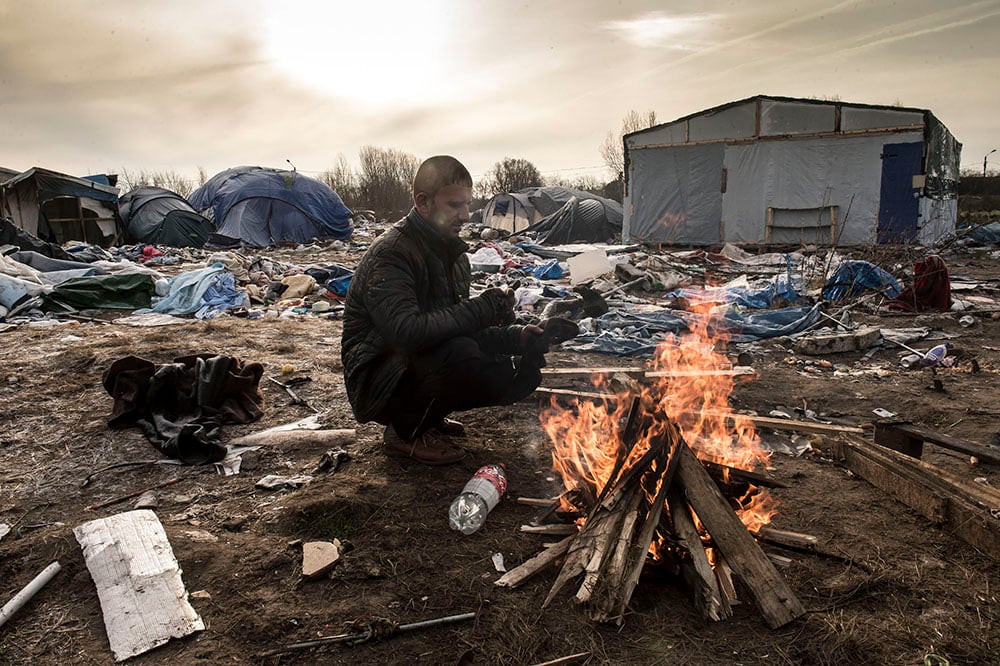The actors performed Hamlet to residents of the refugee camp
The enthusiastic whooping and cheering almost drowned out Bernardo’s opening line, “Who’s there?”, but five minutes in, a particularly unlikely matinee audience was engrossed.
Under a steely grey sky, in bitterly cold weather, actors from Shakespeare’s Globe performed Hamlet on Wednesday to about 300 refugees at the ad hoc camp in Calais, known as the Jungle.
It was a wild thing to do but also entirely appropriate. Joe Murphy, a playwright and cofounder of the Good Chance project, said it was the ideal play to stage.
Murphy said: “Hamlet is the story of a young man who is depressed and frustrated, between life and death, who does not know what to do, who is struggling to make decisions.
“That story is going to translate to thousands of people here who are in exactly the same position. There are a lot of young men and unaccompanied teenagers here. We are seeing kids going through the biggest struggle of their lives, falling apart mentally and physically, losing their minds … it is a tragedy to watch.”
Volunteers began making the temporary outdoor stage from wooden pallets at 8am. It was dismantled after the play, destined to become shelter material.
One of the young men watching was a nurse who had been forced to be a soldier in Eritrea, who, smiling, gave his name as Hector. “I’ve read the play in a book but never seen it,” Hector said. “It is good to see theatre, good to see the English tradition … It is good to enjoy something.
“Life here is very bad. I’ve been here for six months. We are human beings – would you live here?”
One of the aims of Good Chance is to provide some light amid the bleakness. About 6 000 refugees from 22 countries live in the camp, the majority hoping to get to the United Kingdom. But, according to volunteers, most doubt it will ever happen. Tensions were running particularly high this week after riot police and bulldozers destroyed makeshift houses in what was known as the Kurdish field, as well as a mosque and the Eritrean church.
“It was awful,” said Joe Robertson, Good Chance’s other founder. “You could hear the pastor wailing for about an hour and a half.”
Benjamin, a builder from Iran, was watching the performance with interest as he had seen Hamlet performed in his home country, in Farsi. “The language is very beautiful,” he said. “This is very good.”
His friend, a software programmer who declined to be named – “call me Hamlet” – agreed. “It is good to have something to cheer you up. This changes the mood; it brings us together.”

Hemn, a Kurd migrant, keeps warm next to a fire in a makeshift camp known as ‘the jungle’ in Calais. (Philippe Huguen, AFP)
Hamlet is part of the Globe to Globe tour that set off in April 2014 with the ambitious intention of visiting every country in the world. They were recently in the Seychelles, a far cry from the bone-chilling cold of the post-apocalyptic Jungle.
As it is simply not physically possible to enter every single country, the theatre company has already played in several refugee camps: to Syrian refugees at the Zaatari camp in Jordan, to Yemeni refugees at the Markazi camp in Djibouti, and to refugees from the Central African Republic in Mandjou, Cameroon.
Dominic Dromgoole, the artistic director of Shakespeare’s Globe, said performing in refugee settlements was never part of the original plan. “Two years is a long time in global politics. The sheer scale and tragedy of the current refugee crisis demands a response, however small.
“It is a great privilege to play for displaced people in Calais. As a theatre company the only gesture we can offer is this: a show that we hope speaks to the human spirit at its greatest and its darkest moments.”
Murphy said Wednesday’s performance was “a remarkable, beautiful thing”. The audience, who were offered popcorn, chai and synopses of the play in English, Pashto, Farsi, Arabic, French and Kurdish, did not get every nuance, but, said Murphy, “Who does?”
Robertson said the work they put on generally “either allows people to escape their situation or confront it”.
It is not a question of high culture or low culture, said Robertson. “There is a tremendous culture of performance here … music, puppetry, circus, mime, movement. People need that mental stimulation. They need two hours in the day when it is not about waiting in line for food.
“If you strip it down, it is about people and communities being together to experience something, and all are focused on what is happening on stage. That is a joyous and important thing and that is what both high and low art, for want of better words, is.”
Joe Friday, who founded A Home For Winter, which builds shelters in the camp, said it was striking how many educated people with good professions – architects, engineers and pharmacists – were in the camp; they could pay the exorbitant fees charged by people traffickers.
“The politics are complex, the humanitarian aspect of things is simple … people deserve the dignity of a warm and safe place to sleep until a longer term solution can be found.” – © Guardian News & Media 2016